Proper nutrition for weight loss begins to catch our attention when we understand that diet does not help. Diet doesn't help - that's a fact. Why? The answer lies in the prohibitions and prohibitions found in modern and well-known diets, "proven over the years". Proper nutrition for weight loss should be varied, healthy and nutritious, no matter how weird. There are some basic principles of such nutrition. And also a lot of misconceptions, misconceptions, stories about super great foods, blacklists of "dangerous foods", as well as stories about their wonderful recovery.

Before starting a conversation about nutrition, you need to understand that in recent years, more precisely, over the past 25-30 years, the balance of basic nutrients - proteins, fats and carbohydrates - has tended toward the carbohydrate component. At the same time, you do not have to strain and count too much-go to any store and look out the window with candy. They spend almost a quarter of the store space! And the first step to switching to the right diet for weight loss is the complete rejection of sugar in the daily diet. Sounds scary, doesn't it? Do you know why? Because sugar addiction is the same as drug addiction.
- All right, this begins. . . - someone will say in frustration, - Again prohibitions and restrictions!
A few minutes away from your attention, and you will agree that giving up sugar can be a huge breakthrough in improving the health of the body and, as a consequence, losing weight.
We need carbohydrates. But which one? We’ve all heard of fast and slow carbs. We need a slow one. Dishes made from cereals, wheat flour, vegetables. . . Fruits and berries are full of fast carbs, but it’s better to eat fruits and berries than to buy sweets in the pastry section. Many nutritionists recommend to abandon carbohydrates strictly and abruptly, and of any kind, reducing their consumption to 20-50 g per day. A sharp transition from habit to useful can cause you dizziness, loss of energy, bad mood and the belief that it is not very useful and that is proper nutrition.
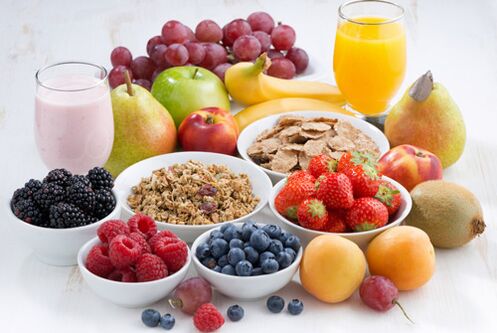
Proper nutrition for weight loss will provide a lot of benefits and joy if you shift gradually, consistently and not straying. But first you have to understand why our bodies are so hard to resist any change, especially a decrease in the amount of sugar.
Sugar has really become the specter of our time. Only a few products are offered to us in the supermarket despite the lack of a teaspoon of sugar. We’re not even talking about candy right now! Juices, yogurts, marinades, sauces, semi -finished meat products, sausages and sausages, fish preservatives, instant soups, instant noodles. . . The list is almost endless! Even more terrible is the upcoming transition to a new dietary principle - it turns out we have almost no food! Don't panic, there is a way out, and it's quite peaceful.
Proper nutrition for weight loss starts with three steps.
Step one:discard sugar in its pure form. Tea, coffee, compote without sugar. We reject intake, jams, sweets, chocolates, cakes and the joy of having tea with friends or during work breaks. Ice cream, cakes, even low -calorie marshmallows are banished from our tables! All carbonated beverages are prohibited. Try sugar -free for two weeks, just two weeks - you’ll be pleasantly surprised. Tea, it turns out, tastes different. Coffee too. Cocoa with milk, but without sugar, costs better than stimulants. And what to serve with tea? At this stage, nuts (not salted), dried fruit, energy mixture with honey (a mixture of nuts and dried fruit, through a meat grinder, you can add lemon), sandwiches with butter (yes, yes! ), Regular cheese and sausage, andbetter with homemade boiled pork, with caviar, lightly salted salmon, etc. At the same time, tea with all these items should be included in breakfast, lunch or dinner, and not the usual snacks. However, about snacks a little later.
Second step:As the body shifts from fast to slow carbohydrates, it’s time to get rid of foods that have a high glycemic index: premium wheat flour, white rice, and potatoes. That is, all the breads, buns, pies, porridge made from peeled rice, semolina porridge, as well as everyone’s favorite manna and potato pies are automatically transformed from everyday foods into delicacies. Yes, and the soup is now also without potatoes. At the same time, rye bread and bread products made from wheat flour (without sugar, remember? ), Steamed buckwheat or just watered with clean water overnight, instant oatmeal, they are well mixed with fermented dairy products, as well as all exotic orforgotten cereals like spelled, quinoa. In addition, you need to remove sweet fruits from the diet - bananas, grapes, pears. Berries are not included in this list due to their high acid content.
Third step:at this stage, you should leave out carbohydrates, leaving only the natural carbohydrates that are part of sour vegetables and fruits. However, sometimes the first two steps are enough to lose weight significantly. And if you meet a few more conditions in parallel, then you don’t have to find new foods for yourself - you’ll move on to a whole new level, where proper nutrition is more important and lifelong.
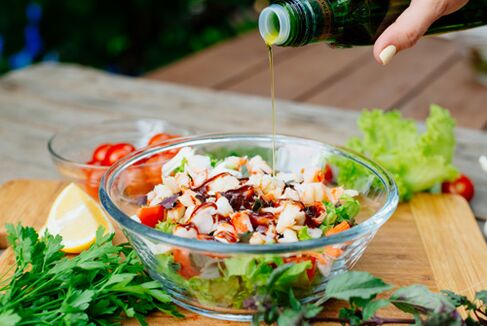
Proper nutrition for weight loss should vary.This means that the balance should include not only the well -known BJUs (proteins, fats and carbohydrates), but also vitamins and micronutrients. And if carbohydrates bring us energy in a pure and accessible form, then it is more difficult for the body to get this energy from protein, and even more so from fat. But, as is often the case, what is hard to come by is usually the most useful. Calories from carbohydrates are usually excessive, our bodies barely spend time processing them, which is why "sugar calories" so quickly get into a comfortable fat roll.
Protein is very important for our body.Protein is essential throughout life: in childhood it is a building block, in adulthood it is an element that helps our body function and take care of itself as well as possible for as long as possible. Determine for yourself: proteins perform protective functions, help the production of antibodies, transport, hemoglobin the most famous protein supplies oxygen to every cell, regulation - normal hormone production is not possible without proteins, motor - all types of movement are provided by myosin and actin proteins, plastics - proteinscollagen is responsible for the condition of connective tissue, the appearance of the skin, etc. , energy - proteins supply the body with energy. But perhaps one of the most important tasks of proteins is the preservation and transmission of gene information. It is believed that the increasingly common terrible disease "Alzheimer's disease" is directly related to inadequate protein intake (not only with it, but the second most important component is slightly lower).
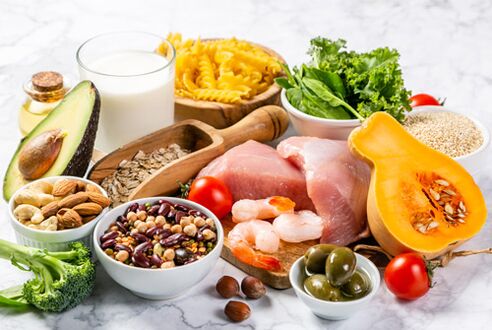
How much protein does the average adult need? Many nutritionists, doctors and proponents of proper nutrition adhere to the norm of protein intake, concluded more than a hundred years ago by German scientist Max Rubner, and this norm is 0. 33 g of protein per 1 kg of human weight. Much has changed since then, science has advanced, and recent studies have concluded an average rate of 1. 2-2. 0 g per 1 kg of weight. Impressive difference. Moreover, 1. 2 - 2. 0 g is not the weight of the product, for example, a piece of meat or a number of nuts, but the content of pure protein in the product. A sample table of high protein foods can be found on our website. Our website has written about the benefits of protein products more than once, but it doesn’t hurt to repeat this general truth.
Despite the popularity of vegan diets, raw foods and vegetarians, we still need at least 50% animal protein to keep the body healthy and not in a state of exhaustion. These are eggs, dairy products, fish and seafood, meat and offal. It is this protein that has a complete set of amino acids, unlike plant foods. Although they must be eaten, if only because variety is the essence of proper nutrition!
It is clear that there are few products on our planet that consist of one substance. Almost all foods are a combination of protein, carbohydrates, and fats. And here with the last ingredient - fat - is probably the biggest crime story in the history of nutritional science. At one time "perfect", fat was described as the enemy of health. Everyone has heard horror stories about cholesterol, plaques on blood vessels and other horrors. And seeing how stores fill their product range with low-fat or low-fat products entirely with quick tenderness, you begin to doubt the sincere desire to give us "right", "healthy", "alive" food, because nothing is right anduseful if there is no fat in the diet.
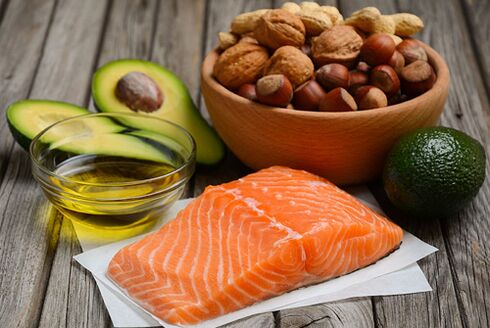
So what is the function of fat in our body? You will say - helps in the assimilation of fat -soluble vitamins. Is that all? From biology lessons from school days, one will remember the heat exchange function of fats. Thus, the most important function of fats in the body is sufractant metabolism, that is, in simple terms, ensuring oxygen exchange in the alveoli of the lungs. Fat coats the walls of the alveoli with the thinnest layer and allows us to breathe and. . . live. My grandmother’s methods for treating lung disease immediately emerged: badger fat, dog fat, goose fat, hot milk and butter - wherever there was fat, inside and out, and it helped! And, however, still helpful, the only drug for the treatment of hypoxia (oxygen starvation), which is now sold for wild money, is actually a fat emulsion. Another important function of fats is membrane synthesis. The cell membrane is composed of 70-85% fat, and the function of the membrane is to ensure cell protection, thermal insulation and selective permeability (because not everyone who wants to enter the cell is useful and necessary for it). The myelin layer, our nerve’s insulating sheath, is 70-80% saturated fat. Without myelin - affected by Alzheimer's disease, dementia sclerosis and dementia. Fat is one of the most important nutrients essential for the construction of membranes, myelin sheaths, ensuring their work, as well as the function of the central and peripheral nervous systems. Keep this in mind when choosing between 0, 5 and 3, 2% fat milk.
Another important function of fat is hormones. These fats are the source of hormone synthesis, and there are many of them in our body. These are growth hormones, protein hormones, thyroid hormones, digestive system hormones, steroid hormones, adrenal hormones, sex hormones, etc. It is clear that the slightest bias, the lack of any hormone threatens with major disruption in the work of the whole organism. Sudden onset of blackheads and acne, all types of skin rashes are signs of low androgen levels. Frequent headaches "for no reason" can be a sign of low estrogen levels. Persistent insomnia - insufficient progesterone. Fatigue, tiredness and even fatigue even during rest can be a sign of violation of thyroid hormone production. Hair loss is also a sign of this disorder. Weight gain can be caused by high levels of the hormones estrogen, cortisol, and insulin, coupled with low levels of testosterone. Forgetfulness and distraction are indicators of low estrogen and cortisol levels. How is it all connected!
Fat is responsible for thermal regulation. That’s why men who don’t diet are often hotter than women who regularly lose weight. Persistent freezing of the hands and feet is likely a sign of fat deficiency, if not some kind of congenital anomaly. The most well -known function of fat is soluble and helps the absorption of fat -soluble vitamins: A, E, D, K. Take a low -fat diet and drink vitamin complexes - not an option, vitamins will not be absorbed.
And finally, the most important - vitamins, minerals, macro and micro elements. These ingredients are available in different amounts and combinations in all products, but special attention should be paid to fresh vegetables, roots, fruits and berries. One of the most valuable vitamins - vitamin C - is not synthesized in our body, and we can get it only from fresh plant products. Our website has filled the entire section on vitamins, read on, this is useful! Plant foods contain enzymes and flavonoids, all kinds of minerals, without which we can not function normally. For example, potassium - the work of the heart without it will be disrupted. Magnesium is responsible for the health of the brain, nervous system and hormones and is involved in metabolic processes. And even in plant products there is fiber - without it, the process of digestion and peristalsis is almost impossible!
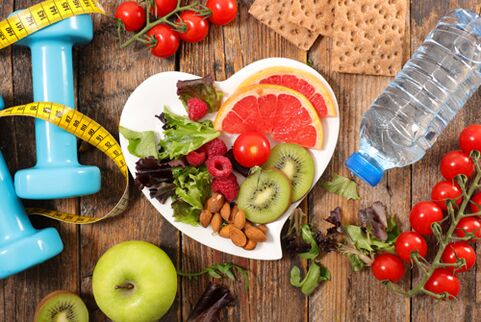
Proper nutrition to lose weight and improve the body includes the following principles:
Eat no more than three times a day. Unexpected, isn't it? But what about 5-6 meals a day, which is advertised in many recommendations? Such fractional foods are ideal for children, athletes and severely ill citizens. If you do not fall into this category, eat three or two meals a day.
Eat only when you feel hungry, not at night. Breakfast is an option! If you don’t want to eat in the morning, schedule breakfast a few hours later. Don’t put food into yourself just because someone says breakfast is the most important thing.
Learn to listen for yourself and understand the difference between hunger and the habit of mixing something between them. The following suggestions will help with this.
Drinking water. Not in liters, as is sometimes advised. Not boiled. A suitable bottle or spring. How to drink it is easy to embarrass: 2 lukewarm glasses (not cold and not boiling) in the morning, 1-2 glasses during the day and 1 at night. Sometimes it’s enough to drink water to understand that it’s just thirst, not hunger.
Get used to buying all kinds of nuts and seeds more often. In addition to fats, they contain a large number of macro and micro elements.
Eat whole foods. That is, not fat -free! Cottage cheese - 9% fat, no less, but with sour cream, coffee with cream, butter sandwiches, fatty cheese, fatty sea fish, exotic avocados, smoked meats! This is not a typical "from fire to fire. " One step is needed in all things, of course.
Don't forget about protein! But no less important is to combine them. And this proposal will be the last.
Eat vegetables. Lots of vegetables and herbs. Fresh, pickled, pickled, steamed, boiled and even fried in oil! But fresh salads are certainly preferred. It is not difficult to calculate the amount of vegetables: mentally divide your plate into two parts-half will be spilled by vegetables, and the second corresponds to the same minimum of protein, fat and carbohydrates.
Proper nutrition for weight loss is not a strict schedule and recipe. This is a deliberate approach. All of these tips will only work if there is an almost complete rejection of carbohydrates. If you combine protein with carbohydrates (mashed potatoes with slices) or fat with carbohydrates (meat with bread) in one plate, you’re done. More precisely, no, of course, you will not die immediately. You will go on living, sighing every new kilogram and complaining about injustice ("I'm really sitting on the same water, where does the fat come from??? "). No need to sit on the water, no need to torture yourself with hunger, food products. Start with three steps and walk, without turning anywhere, for health and beauty.















































































